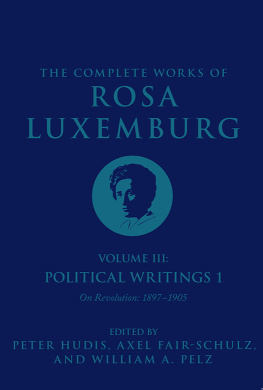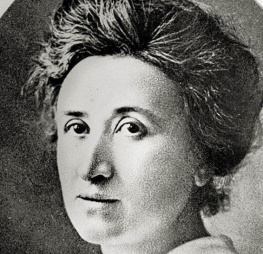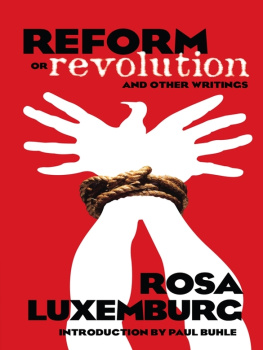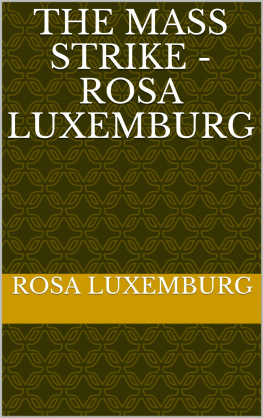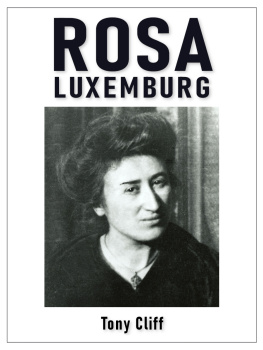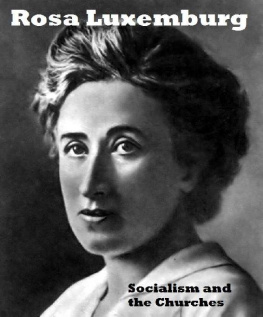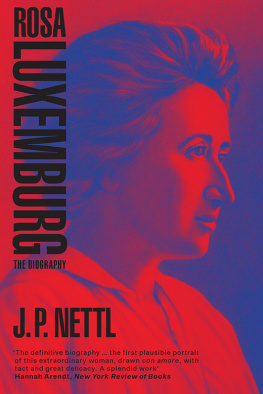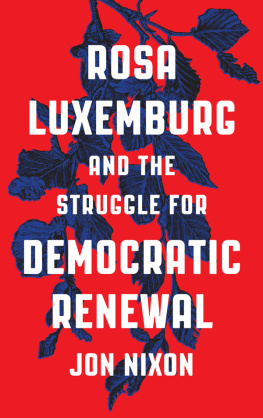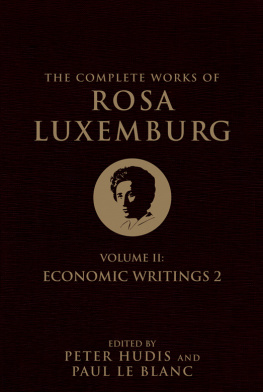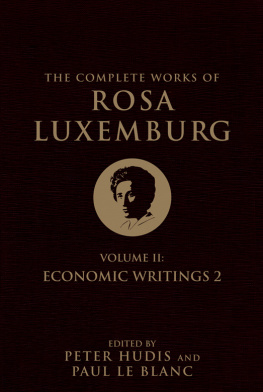Contents

The Complete Works of Rosa Luxemburg
The Complete Works
of Rosa Luxemburg
VOLUME III, POLITICAL WRITINGS 1:
ON REVOLUTION18971905
Edited by Peter Hudis,
Axel Fair-Schulz, and
William A. Pelz
Translated by George Shriver,
Alicja Mann, and Henry Holland

Verso would like to express its gratitude to Rosa Luxemburg Stiftung for help in publishing this book

The publisher also gratefully acknowledges the assistance of Dietz Verlag, publisher of Rosa Luxemburgs Gesammelte Werke, the German source of all English translations herein
First published by Verso 2019
Translation George Shriver, Alicja Mann, and Henry Holland 2018
All rights reserved
The moral rights of the authors have been asserted
1 3 5 7 9 10 8 6 4 2
Verso
U.K.: 6 Meard Street, London W1F 0EG
U.S.: 20 Jay Street, Suite 1010, Brooklyn, NY 11201
versobooks.com
Verso is the imprint of New Left Books
ISBN-13: 978-1-78663-533-4
ISBN-13: 978-1-78663-536-5 (U.S. EBK)
ISBN-13: 978-1-78663-535-8 (U.K. EBK)
British Library Cataloguing in Publication Data
A catalogue record for this book is available from the British Library
Library of Congress Cataloging-in-Publication Data
A catalog record for this book is available from the Library of Congress
Typeset in Minion Pro by MJ&N Gavan, Truro, Cornwall
Printed in the U.S. by Maple Press
Dedicated to the memory of William A. Pelz (19512017)
Scholar, teacher, activist, and friend of all who
sought to build a truly new society
Contents
This volume would not have been possible without the tireless efforts of numerous scholars who have done monumental work over the past several decades in bringing Luxemburgs manuscripts, unsigned articles, and other previously unknown or inaccessible writings to light, such as Annelies Laschitza, Eckhard Mller, Holger Pollit, and the late Feliks Tych and Narihiko Ito.
It would also not have been possible without Evelin Wittich of the Rosa Luxemburg Foundation, who assisted us at each step of this enormous and difficult project of issuing the Complete Works, as well as Jrn Schuetrumpf of Dietz Verlag, who advised us on the selection of the materials in this volume. Holger Politt provided us with the originals of the Polish-language articles as well as editorial assistance. We benefited greatly from the research of Eric Blanc as well as discussions on the Polish workers movement with Krystian Szadkowski and Wiktor Marzec. Ottokar Luban provided invaluable advice and suggestions on the project as a whole. Special thanks to Rory Castle for his review of the manuscript and research assistance, Laura Fair-Schulz for devoting many hours to proofreading and editing, and Paul Le Blanc, Sebastian Budgen, and Jacob Stevens for their help on numerous aspects of the project.
Most of all, we wish to thank the Rosa Luxemburg Foundation in Berlin, which covered the cost of many of the translations, as well as the numerous individuals who made this volume possible through their contributions to the Toledo Fund, which also helped cover translation costs. And special thanks to our translatorsGeorge Shriver, Alicja Mann, and Henry Hollandwho overcame many obstacles in performing a labor of love in bringing Luxemburgs voice to us anew.
Sadly, our colleague and friend William A. Pelz, who coedited this volume and coauthored its introduction, passed away in December 2017, before this book went to press. His tireless work as scholar, teacher, and friend to so many who sought to build a new society based on the principles embodied in the work of Rosa Luxemburg will be sorely missed. We dedicate this volume to his memory.
This volume brings together Rosa Luxemburgs writings on the central theme of her life and workrevolution. It is the first of three volumes of the Complete Works devoted to this subject, containing her writings from 1897 to the end of 1905. Volumes IV and V of the Complete Works will consist of the rest of her writings On Revolution, from the years 1906 to 1919.
In organizing her political writings around specific themes, we by no means imply that Luxemburgs concern for revolution is restricted to the writings in the three volumes devoted to this subject. All of her workfrom her economic theory to political writings on spontaneity, organization, nationalism, and democracyhas the concept of revolution at its core. The materials in this volume represent writings that directly address the question of revolution, most of all her discussions of the 1905 Russian Revolutionone of the most outstanding revolutionary upheavals of modern times.
The German-language articles and speeches in this volume are translated from volumes 1.2, 2, and 6 of her Gesammelte Werke; the Polish-language documents are translated from the original newspapers and journals in which they first appeared.
We have greatly benefited from consulting the editorial apparatus and footnotes provided by the editors of the Gesammelte Werke, as well as Holger Pollitts footnotes and introduction to the German-language collection of some of Luxemburgs Polish writings in Arbeiterrevolution 1905/06: Polnische Texte (Berlin: Dietz Verlag, 2015). The editors of this volume have supplied the footnotes (as well as the Name Glossary), with the assistance of the work done by many others who came before us.
I. WHY A COMPLETE WORKS OF ROSA LUXEMBURG? WHY NOW?
The Complete Works of Rosa Luxemburg is a project almost a century overdue. That the world would be well served by a comprehensive series gathering together all of Luxemburgs thought-provoking writings has been widely accepted for the better part of a century. V. I. Lenin, sometimes critic and political rival of Luxemburg, wrote in Pravda a few years after her assassination of his frustration with German Communists whom he demanded should, at once, publish her complete works. Although this has yet to fully be realized even in the German language, English access is much further behind, since most of Luxemburgs work remains untranslated.
Luxemburgs life and work speaks to us in new ways today, since she raised vital questions about what it means to be human in subjecting to critique both capitalism as well as the revolutionary tendencies that claimed to represent its alternative. Few Marxists of her generation produced works that more thoughtfully pose the question of what happens after the revolution, as especially seen in her searing critique of Lenin and Trotskys suppression of democracy in her 1918 manuscript The Russian Revolution. While recognizing and acknowledging the significance of the Bolshevik achievements during and after the October Revolution and their exceedingly difficult and adversarial circumstances, Luxemburg nevertheless became increasingly concerned about the authoritarian trajectory of the new Soviet state. Luxemburg may not have fully answered the overriding question that haunts us todaywhat is a viable alternative that avoids the disappointing, and in some cases even disastrous, outcomes of the various socialist and communist revolutions (and the efforts to achieve them) of the twentieth century? But her distinctive political and personal perspective can greatly aid the effort of socialists, feminists, anti-racist activists, and others to do so.

